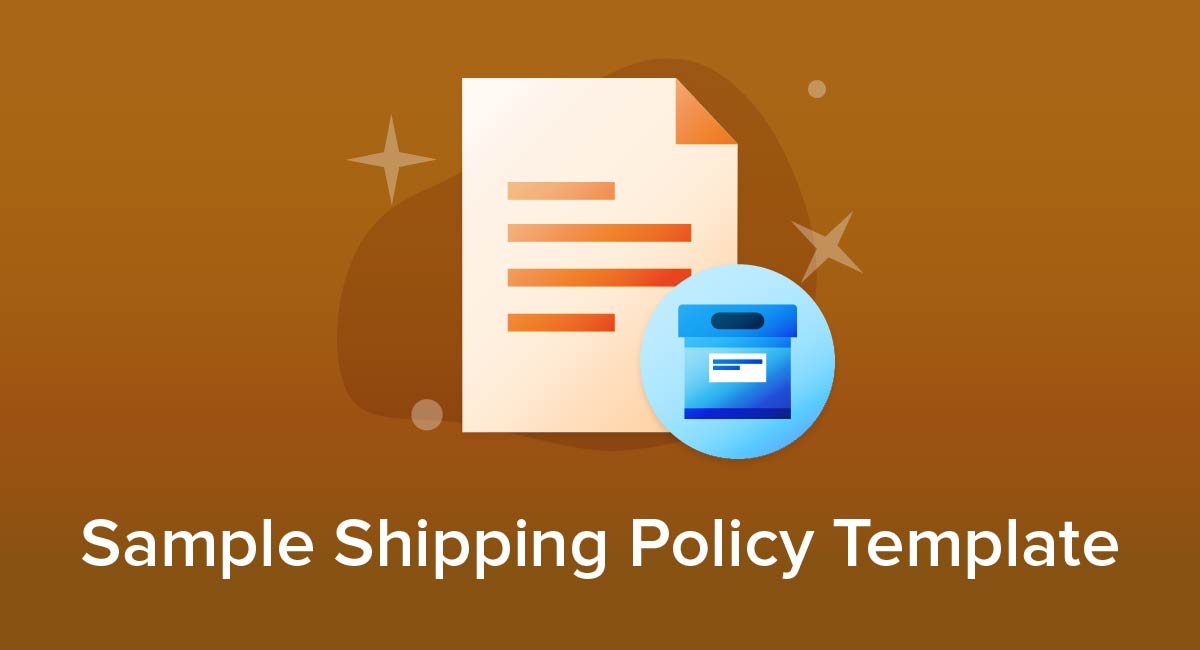
An All Sales Are Final Policy is where you let customers you will not accept returns or issue refunds. Exactly how such a policy operates and whether it's limited by the law will depend on your business where it operates. This means you need to think carefully about whether to have an All Sales Are Final Policy and what to include in it.
Here's what you need to know about an All Sales Are Final Policy including why to have one, how to write one, and how to display it.
Use FreePrivacyPolicy.com to generate the necessary legal agreements for your website/app:
- Free Privacy Policy Generator
- Free Terms and Conditions Generator
- Free Cookies Policy Generator
- Free Disclaimer Generator
- Free EULA Generator
- Free Return & Refund Policy Generator
You check our Free Cookie Consent to start making your business legally compliant with the Cookies Directive in the EU.
- 1. What is an All Sales Are Final Policy?
- 2. Why Should You Have an All Sales Are Final Policy?
- 3. What to Include in an All Sales Are Final Policy
- 3.1. Your Default Position that All Sales are Final
- 3.2. What the Policy Covers
- 3.3. Details about Returns (When or if Allowed)
- 3.4. That the Shopper Has Legal Rights
- 4. How to Display and Get Agreement to an All Sales Are Final Policy
- 5. Summary
What is an All Sales Are Final Policy?
An All Sales Are Final Policy is a form of a Return and Refund Policy where the customers' rights and options are extremely limited.
While the phrase "All Sales Are Final" seems self-explanatory, such a policy normally goes into more detail about what customers can and can't do after buying goods. It refers to whether and how you let customers return goods for a refund, replacement or repair.
In particular, it will explain which of two main approaches apply:
- The customer cannot return goods after simply changing their mind about the purchase.
- The customer cannot return goods under any circumstances (unless the law says otherwise).
An All Sales Are Final Policy could apply to your entire operations or simply cover particular departments or types of purchase.
Why Should You Have an All Sales Are Final Policy?

Using the phrase "All Sales Are Final" in your policy name helps reduce any ambiguity by making clear that your default approach is to not accept returns. This means you don't have to deal with requests from customers who mistakenly assume they can return goods in most cases.
The policy will provide details about how the restrictions work and any circumstances where you do accept returns.
Ideally the All Sales Are Final Policy as a whole will:
- Reduce the number of returns and attempted returns
- Reduce the likelihood of disputes over return attempts, which cost you time, money and customer goodwill
- Show customers you are being transparent with them
- Help customers make a more informed decision about whether to make a purchase
Using an All Sales Are Final Policy to cover specific purchases only can help in several situations:
- You want to offer discounts or run a clearance sale, but that price wouldn't make financial sense if you risked getting a lot of returns.
- You are selling goods where there's a strong likelihood of customers attempting a return. This could include products with cosmetic damage or clothes sold online for home delivery.
- You are selling goods that are difficult or impossible to resell after a return, such as underwear or perishable foods.
What to Include in an All Sales Are Final Policy

Your All Sales Are Final Policy should include clear, detailed information about the fact that you do not accept returns, while addressing any exceptions you may make on this rule. Here are some sections that you'll find in most All Sales Are Finally Policies.
Your Default Position that All Sales are Final
To reinforce the "All Sales Are Final" approach, you can open the policy with a strong statement that makes clear the default position is that you do not accept returns or issue refunds.
You can also reiterate that returns and refunds only apply in specific exceptions detailed in the policy. Common examples could include the goods being damaged or faulty.
To avoid ambiguity, you can list some circumstances where customers cannot return goods. This could include clothes not fitting, customers changing their minds, or cosmetic damage. Make clear this list is simply an example and is not exhaustive.
Slow AF Run Club has a good balance of stressing the principle of its policy, explaining the rationale behind it, and noting the key exception:
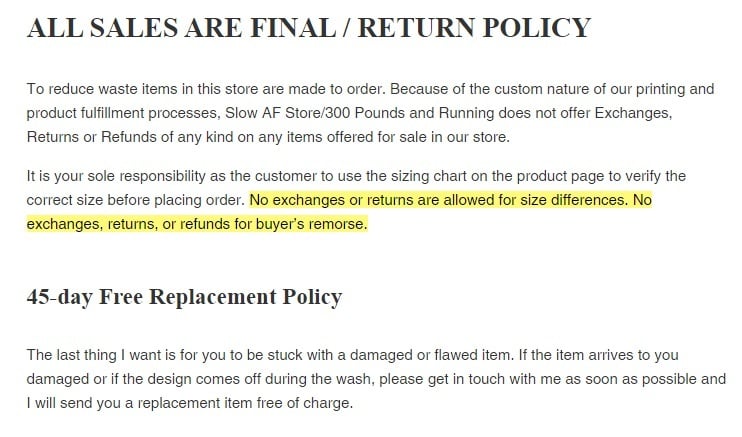
Bricks Smart gives clear examples of cases where returns are not allowed:

What the Policy Covers
Make clear which of the following applies:
- "All Sales Are Final" covers any and all purchases.
- "All Sales Are Final" covers specific product types and that you have a more generous Return and Refund Policy in other cases.
- "All Sales Are Final" covers a specific situation, for example time-limited discounts or a clearance sale.
Abysse explains that the "All Sales Are Final" stance applies only to sale items:
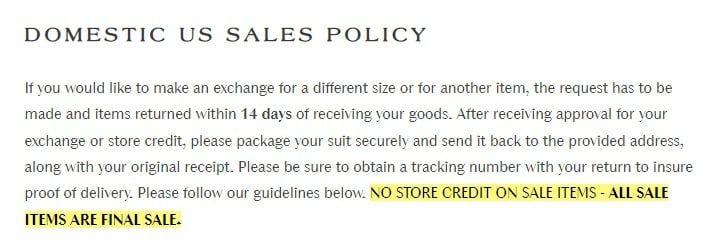
Details about Returns (When or if Allowed)
If "All Sales Are Final" is your main policy, you should detail how customers can make returns in cases where you do allow them. Detail the following:
- How to initiate a return
- Where to send returned goods (or which stores the customer can return the goods to in person)
- How to package returned goods. For example, is original packaging required?
- Who arranges a delivery
- Who pays for the delivery (including if the customer pays up front but you then refund the costs)
- Whether the customer must use a tracked or signed-for service
If "All Sales Are Final" only applies to particular purchases, link to your main Return and Refund Policy that outlines the rest of your stance on returns.
You should also explain the following points about refunds:
- Whether you refund money as cash, by check, or to the original payment card
- Whether you only refund as a credit voucher or gift certificate
- Whether you make any deductions from the refund, for example to cover shipping or wear and tear
YOYA clearly explains how refunds will work:

ME BOUTIQUE explains which party is responsible for shipping costs:

That the Shopper Has Legal Rights
Many jurisdictions have laws that give customers some rights to returns and refunds that cannot be overridden by a store policy. This can be the case even if the customer has agreed to your policy when making a purchase. Common examples include goods being faulty, damaged in transit, or not being suitable for their advertised purpose.
Adding a clase about legal rights and protections to your All Sales Are Final Policy can avoid a customer feeling misled or even taking court action against you for breaching their rights.
At the absolute minimum, make clear that the customer may have automatic legal rights depending on their location and that your All Sales Are Final Policy does not override these rights.
Highland House of Fraser highlights an "all sales are final" situation while stressing this doesn't affect a customer's legal rights:

For added certainty, you can detail these rights, for example when they have a right to return faulty goods.
How to Display and Get Agreement to an All Sales Are Final Policy

If you plan to rely on your All Sales Are Final Policy to refuse returns, you need to make sure to give customers an opportunity to know about the policy before making a purchase. This means you need to display the policy as conspicuously as possible.
In physical stores, display the All Sales Are Final Policy prominently at the point of purchase such as a sales counter. (Note that in some jurisdictions, customers have an automatic right to return goods unless you have physically displayed the policy.) Do not simply put the policy on a receipt or other document that the customer only gets after making a purchase.
On a website, display the All Sales Are Final Policy as close as possible to the point where the customer places an order. You could display it as:
- Text on the order confirmation page
- In the website footer or navigation menu
- A drop-down display on the order confirmation page
- A link from the order confirmation page to the full policy.
Here's how Ashanti Swimwear links to its Refund Policy from every page on its site through a navigation menu:
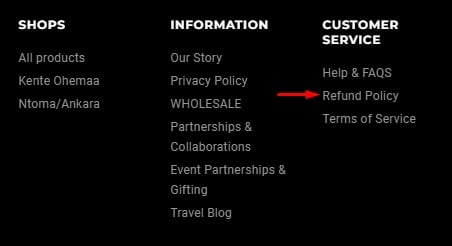
Make sure also that the customer has confirmed reading and agreeing to the policy. You can do so in the same way you get confirmation of agreement to any other legal agreements such as a Privacy Policy or Terms and Conditions agreement.
The best method is an "I Agree" checkbox, toggle or similar method where you:
- Clearly say that proceeding with the order means accepting the agreement(s)
- Link to the agreement(s)
- Require the customer to give an active indication such as ticking a box
- Consider making it impossible to complete the order without giving this indication
Island Escape Fragrances requires customers to tick a checkbox confirming they've read the linked Terms and Conditions agreement:
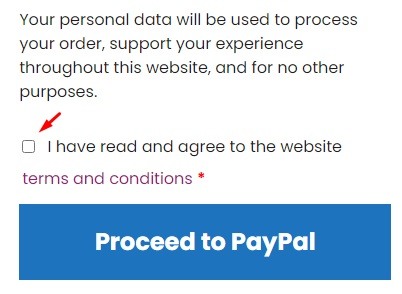
The site clearly states that customers who place an order signifies that you agree to the store's terms and policies:

Later on the same page is an All Sales Are Final clause that shoppers agree to when making a purchase:

Summary
Let's recap what you need to know about an All Sales Are Final Policy.
"All Sales Are Final" is a type of Return and Refund Policy. It clearly establishes a principle of not allowing returns or giving refunds.
You must make clear if the policy means no returns at all (except where legally required) or rather no returns in cases where customers have simply changed their minds.
A clearly written All Sales Are Final Policy should reduce the number of attempted returns and disputes and should cover:
- Which purchases it affects
- Whether you allow any returns and, if so, when
- The logistics of making returns
- A legal note to say customers may have rights that your policy does not override
Display your All Sales Are Final Policy prominently. In stores, place it at the payment point. On websites, put it or link to it just before somebody confirms an order, and always display it as a static link in your website's footer for access at any time by the public.
Use an "I Agree" checkbox or similar approach to get confirmation that the customer has agreed to the policy before completing a purchase.
